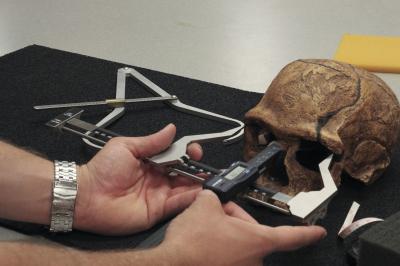A drop in testosterone levels around 50,000 years ago led the the development of art and tools, researchers believe.
They say the drop, which led to a change in the shape of skulls, coincided with a blossoming in culture.
The two could be linked, as humans developed a more co-operative outlook as levels dropped.
Modern humans appear in the fossil record about 200,000 years ago, but it was only about 50,000 years ago that making art and advanced tools became widespread.
The study, based on measurements of more than 1,400 ancient and modern skulls, makes the argument that human skulls changed in ways that indicate a lowering of testosterone levels at around the same time that the culture was blossoming.
“The modern human behaviour of technological innovation, making art and rapid cultural exchange probably came at the same time that we developed a more cooperative temperament,” said lead author Robert Cieri, a biology graduate student at University of Utah.
According to Duke anthropologist Steven Churchill, “heavy brows were out, rounder heads were in and those changes can be traced directly to testosterone levels acting on the skeleton”.
The research team also included Duke animal cognition researchers Brian Hare and Jingzhi Tan, who say this argument is in line with what has been established in non-human species.
In a classic study of Siberian foxes, animals that were less wary and less aggressive toward humans took on a different, more juvenile appearance and behaviour after several generations of selective breeding.
“If we are seeing a process that leads to these changes in other animals, it might help explain who we are and how we got to be this way,” said Hare.
The Duke study argues that living together and cooperating put a premium on agreeableness and lowered aggression and that, in turn, led to changed faces and more cultural exchange.
“If prehistoric people began living closer together and passing down new technologies, they would have to be tolerant of each other. The key to our success is the ability to cooperate and get along and learn from one another,” Cieri concluded.
Agencies/Canadajournal
 Canada Journal – News of the World Articles and videos to bring you the biggest Canadian news stories from across the country every day
Canada Journal – News of the World Articles and videos to bring you the biggest Canadian news stories from across the country every day




“If prehistoric people began living closer together and passing down new technologies, they’d have to be tolerant of each other,” Cieri said. “The key to our success is the ability to cooperate and get along and learn from one another.”